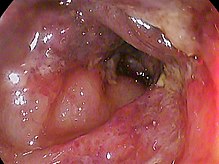Ischemic colitis
| Classification according to ICD-10 | |
|---|---|
| K55.0 | Acute vascular diseases of the intestine - subacute ischemic colitis |
| K55.1 | Chronic vascular diseases of the intestine - chronic ischemic colitis |
| K55.9 | Intestinal vascular disease, unspecified - Ischemic colitis without further details |
| ICD-10 online (WHO version 2019) | |
An ischemic colitis is a non-infectious inflammation of the intestine as a result of diffuse circulatory disorder ( ischemia ) mostly on the bottom of a generalized arteriosclerosis rarely, as a result of an intensive care long-term treatment with vasoconstrictor drugs.
Clinically, there are painful, slimy-bloody diarrhea, possibly with paralytic ileus and subsequent peritonitis . With a complete vascular occlusion, so-called mesenteric infarction occurs with subsequent necrosis of a section of the intestine.
The disease is initially to be regarded as reversible. If the reduced blood flow is remedied ( vascular surgery or via balloon catheter for arteriosclerosis, reduction of intensive care measures) there is a good chance of recovery. If necrosis has developed, the affected section of the intestine can only be removed surgically. In this case the prognosis is rather bad.
literature
- Buchta, Höper, Sönnichsen (Ed.): The hammer exam: revision course for the 2nd section of the medical examination . 2nd Edition. Urban & Fischer in Elsevier, Munich 2008, ISBN 978-3-437-43801-1 , p. 705 ( limited preview in Google Book search).
- Kahl (Ed.): Interventional Endoskopie: Textbook and Atlas . 1st edition. Urban & Fischer in Elsevier, Munich, Jena 2006, ISBN 978-3-437-23620-4 , pp. 72–73 ( limited preview in Google Book search).
